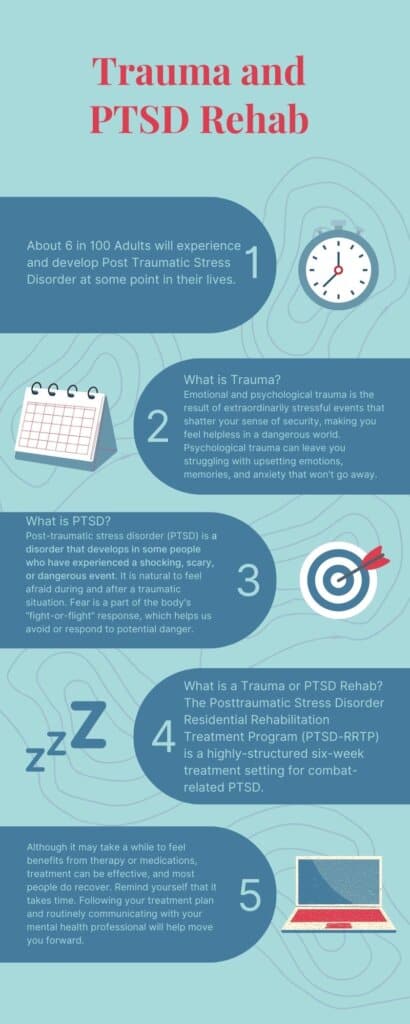Navigating Trauma Recovery Comprehensive PTSD Rehab Programs in Massachusetts
Trauma is a deeply disturbing and distressing event. Which, unfortunately, isn’t just a one-time event and lasts for a long time. And if the traumatic experience isn’t carefully processed, it runs the risk of becoming PTSD. In the United States, the average lifetime occurrence of PTSD is 6.8%. This alarming statistic is the reason we’ll be discussing Trauma and PTSD rehab centers in Massachusetts.
What Should You Do If You Have Recently Been Through Trauma?
There’s no easy way to put this, life after trauma is definitely going to be super difficult. Seeing as you have been through a life-and-death situation, or faced the loss of a loved one, or anything else, nobody expects you to simply forget about the event and move on…
However, there are steps that you can take to manage your emotions and prevent the development of PTSD.
Acknowledge Your Feelings:
Allow yourself to feel the emotions that arise, whether it’s sadness, anger, fear, or a mix of all. Don’t try to suppress or bottle up your feelings.
Talk to Someone You Trust:
Share your experience with a trusted friend, family member, therapist, or support group. Talking about the trauma can help you process it and gain a different perspective.
Practice Self-Care:
Prioritize your physical and mental well-being. Get regular exercise, which helps release feel-good hormones (endorphins). Couple that with a healthy diet and enough sleep for a – body, mind, and soul – complete recovery.
Engage in Relaxing Activities:
Find activities that help you calm down and de-stress, such as yoga, meditation, deep breathing exercises, or spending time in nature.
Seek Professional Help:
If you’re struggling to cope with the trauma or experiencing trauma symptoms, don’t hesitate to seek professional help. A therapist can provide guidance and support as you work through your emotions and develop coping mechanisms.

What to Do If You Have Developed PTSD?
If you believe you’ve developed PTSD, the first step is to calm down and seek professional help right away. It is important to understand the significance of early intervention as it drastically improves the outcome and reduces the long-term impact of PTSD.
A PTSD rehab program will help you in this instance because it offers components specifically designed to treat PTSD.
Components Of Trauma And PTSD Rehab Programs In Massachusetts
Here are a few comprehensive components of PTSD rehab programs that help in dealing with trauma and PTSD.
1. Individualized Assessment:
- Holistic Evaluation: Programs conduct comprehensive assessments to understand the individual’s unique experiences and challenges.
- Identifying Triggers: Pinpointing trauma triggers is a crucial step in creating personalized treatment plans.
2. Evidence-Based Therapies:
- Cognitive-Behavioral Therapy (CBT): Examining and reshaping negative thought patterns and behaviors.
- Exposure Therapy: Gradual and controlled exposure to traumatic memories to reduce their impact.
- Eye Movement Desensitization and Reprocessing (EMDR): Facilitating the processing of traumatic memories.
3. Medication Management:
- Psychiatric Evaluation: Determining if medication is a beneficial component of the treatment plan.
- Symptom Management: Medications may help alleviate specific PTSD symptoms such as anxiety or depression.
4. Group Therapy:
- Peer Support: Sharing experiences within a group setting to foster understanding and support.
- Skill-Building: Learning coping mechanisms and interpersonal skills.
5. Holistic Approaches:
- Mindfulness and Meditation: Cultivating awareness and reducing emotional reactivity.
- Yoga and Relaxation Techniques: Integrating physical and mental well-being.
6. Trauma-Informed Care:
- Safe Environment: Creating a safe and supportive space for individuals to share and heal.
- Empowerment: Focusing on empowering individuals in their recovery journey.
Navigating Trauma Recovery
Trauma Recovery might take some time to arrive, but be patient through the process. All will positively work out for the best in the end. Remember to not bottle everything up; let people hear your story, they want to hear you. Definitely even help you, if you want them to.
And, if you feel you need a safe and confidential environment to process your emotions, let Resilience Behavioral Health help you out. Contact by clicking here or call (888)401.1179 to tell your story.

